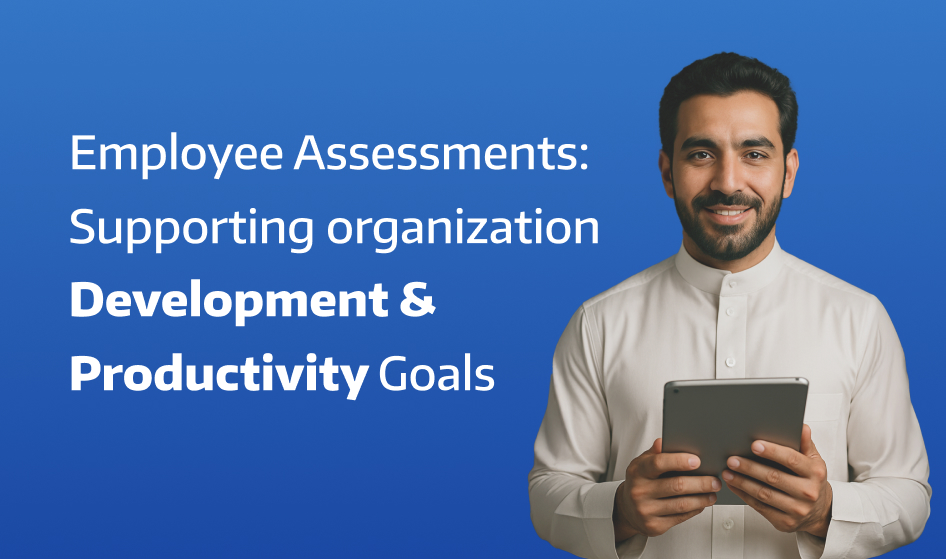Employee Assessment: Supporting Organization Development & Productivity Goals

Business in the GCC and MENA moves fast. To keep up, your company needs to report growth in every department, but is your team really set up to deliver?
We’ve all hired someone because their resume screams big company names and top universities. But have you ever stopped to check if they actually have the skills for the job in front of them? Or are you just going with your gut feeling just because they look charismatic and have good experience?
What if you didn’t have to guess?
That’s where we come in. We believe the secret to better and smarter growth is your people, not operations. The trick is using modern employee assessment tools to build a stronger, more skilled team through talent development.
In this article, we’ll break down the main types of assessments and show you exactly how they tie into your business goals and how they can help you build your A-team.
What Are Employee Assessments?
Employee Assessments are structured tools, such as tests, surveys, and simulations, that give you objective insight into a person’s skills, knowledge, and how they work with others. They go beyond what’s on a resume or what we feel in an interview, to help leaders make informed decisions about hiring, promotions, and development.
The biggest change they bring is moving from subjective opinions to data-driven decisions. Instead of guessing whether someone is right for a role or ready for the next step, you have clear evidence to guide your choices.
Here’s a comparison example:
Employee Assessments serve two main purposes:
- Pre-hire: To ensure you hire people with the skills and traits needed to succeed from day one.
- Post-hire: To identify top talent and areas for growth, helping employees reach their potential, and contributing to overall team performance.
Using these assessments does not replace human judgment. Instead, it supports leaders with reliable information and helps them make better decisions about hiring, promotions, training, and team development. Over time, this approach builds stronger teams, increases productivity, and reduces the risk of costly hiring mistakes.
Types of Employee Assessments
So, what kinds of tools are we talking about? These are structured assessments that give clear insight into your people. Each type focuses on a specific aspect of performance, potential, or fit.
Here’s an overview:
- Competency-based assessments
- Psychometric assessments
- Coding assessments
1. Competency-Based Assessments
Competency-based assessments evaluate a person’s ability to perform the tasks and behaviors required for a role. They go beyond resumes or job history to show whether someone can actually deliver results.
What they measure:
- Job-specific skills: Can they complete the tasks the role demands?
- Decision-making ability: How well do they analyze situations and make choices?
- Industry-specific technical knowledge: For example, accounting principles, engineering standards, or digital marketing metrics
- Problem-solving and critical thinking: Can they identify solutions under pressure?
These assessments reduce hiring risk and ensure your team has the skills needed for critical roles. They can also be used for internal promotions and upskilling, supporting strategic workforce planning, and helping your most technical teams stay competitive.
2. Psychometric Assessments
Skills alone don’t guarantee success. Psychometric assessments measure cognitive abilities and personality traits to show how a person thinks, communicates, and works with others.
What they measure:
- Personality traits: Are they introverted or extroverted, detail-oriented or big-picture thinkers?
- Cognitive abilities: Problem-solving, learning speed, reasoning, and adaptability
- Motivation and values: What drives them at work, and how does it align with your company culture?
- Team compatibility: How well will they fit with their team and the company environment?
These assessments help predict job fit, identify leadership potential, and create stronger team dynamics. When people are placed in roles that match their strengths, engagement and performance improve.
They also provide valuable input for succession planning and leadership development, helping build a resilient and adaptable workforce.
3. Coding Assessments
For specialized roles, technical assessments test practical, hands-on skills. For example, coding assessments for IT roles evaluate a candidate’s ability to perform real tasks in a controlled environment.
What they measure:
- Coding or programming skills: Can a developer write efficient, working code?
- Software proficiency: Can a designer use key design tools effectively?
- Practical problem-solving: Can the candidate apply knowledge in realistic scenarios?
These assessments reduce hiring risk and ensure your team has the skills needed for critical roles. They can also be used for internal promotions and upskilling, supporting strategic workforce planning, and helping your most technical teams stay competitive.
4. 360° Feedback Assessments
360° feedback assessments collect input from an employee’s manager, peers, and direct reports. This creates a detailed view of their strengths, areas for improvement, and overall impact on the team.
What they measure:
- Leadership and management skills: How well do they guide and motivate others?
- Teamwork and collaboration: How effectively do they work with colleagues across departments?
- Communication and influence: Can they clearly convey ideas and impact decisions?
- Strengths and areas for improvement: Insights employees may not see themselves.
This feedback improves self-awareness, supports leadership development, and identifies opportunities for targeted growth. Unlike traditional top-down reviews, it provides a balanced perspective, helping employees develop the skills and behaviors needed for advancement.
Using these tools together helps you understand your workforce. They help leaders make informed decisions about hiring, promotions, training, and team development. Over time, this approach strengthens teams, increases productivity, and reduces the risk of costly talent mistakes.
Build Your A-Team Today
We’ve seen just how powerful the right employee assessment strategy can be, but it’s not easy to do alone—finding the right tests, making sense of the data, and turning it into a real plan. That’s a lot of work.
That’s exactly why we built Zenithr.
We combine everything in one platform, with science-backed tools and advanced technology, like our psychometric assessments powered by Thomas International, so you don’t have to figure it out alone.
Our platform is built for one clear goal: helping you objectively identify top talent with precision. But we don’t stop at data. Zenithr turns insights into actionable plans, laying a foundation for your talent development strategy.
A strong employee assessment program is the cornerstone of achieving your biggest goals. Request a demo of Zenithr today and build your A-team.
Related posts
Explore more
What are the key performance indicators for identifying top talent

How 360 Degree Feedback Drives Leadership Development and Self Awareness

